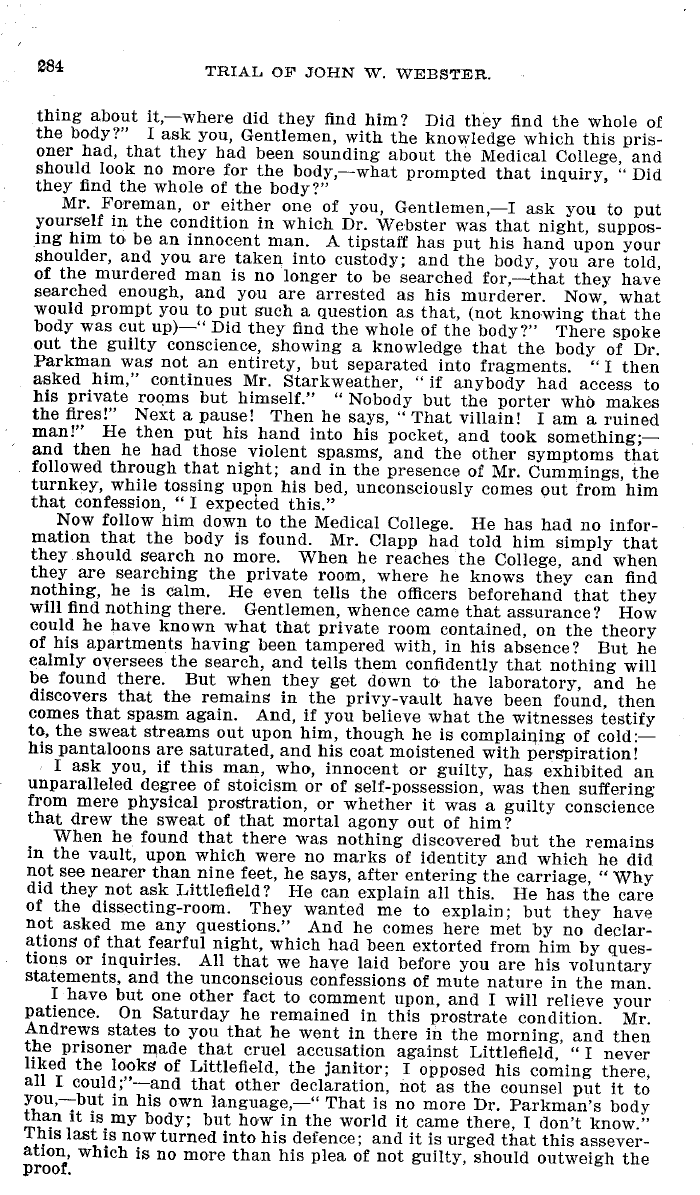|
!284 TRIAL OF JOHN W. WEBSTER.
thing about it, where did they find him? Did they find the whole of
the body?" I ask you, Gentlemen, with the knowledge which this pris-
oner had, that they had been sounding about the Medical College, and
should look no more for the body,-what prompted that inquiry, " Did
they find the whole of the body?"
Mr. Foreman, or either one of you, Gentlemen,-I ask you to put
yourself in the condition in which Dr. Webster was that night, suppos-
ing him to be an innocent man. A tipstaff has put his hand upon your
shoulder, and you are taken into custody; and the body, you are told,
of the murdered man is no longer to be searched for,-that they have
searched enough, and you are arrested as his murderer. Now, what
would prompt you to put such a question as that, (not knowing that the
body was cut up)-" Did they find the whole of the body?" There spoke
out the guilty conscience, showing a knowledge that the body of Dr.
Parkman was not an entirety, but separated into fragments. " I then
asked him," continues Mr. Starkweather, " if anybody had access to
his private rooms but himself." " Nobody but the porter who makes
the fires!" Next a pause! Then he says, " That villain! I am a ruined
man!" He then put his hand into his pocket, and took something; -
and and then he had those violent spasms, and the other symptoms that
followed through that night; and in the presence of Mr. Cummings, the
turnkey, while tossing upon his bed, unconsciously comes out from him
that confession, " I expected this."
Now follow him down to the Medical College. He has had no infor-
mation that the body is found. Mr. Clapp had told him simply that
they should search no more. When he reaches the College, and when
they are searching the private room, where he knows they can find
nothing, he is calm. He even tells the officers beforehand that they
will find nothing there. Gentlemen, whence came that assurance? How
could he have known what that private room contained, on the theory
of his apartments having been tampered with, in his absence? But he
calmly oversees the search, and tells them confidently that nothing will
be found there. But when they get down to the laboratory, and he
discovers that the remains in the privy-vault have been found, then
comes that spasm again. And, if you believe what the witnesses testify
to, the sweat streams out upon him, though he is complaining of cold:
his pantaloons are saturated, and his coat moistened with perspiration!
I ask you, if this man, who, innocent or guilty, has exhibited an
unparalleled degree of stoicism or of self-possession, was then suffering
from mere physical prostration, or whether it was a guilty conscience
that drew the sweat of that mortal agony out of him?
When he found that there was nothing discovered but the remains
in the vault, upon which were no marks of identity and which he did
not see nearer than nine feet, he says, after entering the carriage, " Why
did they not ask Littlefield? He can explain all this. He has the care
of the dissecting-room. They wanted me to explain; but they have
not asked me any questions." And he comes here met by no declar-
ations of that fearful night which had been extorted from him by ques-
tions or inquiries. All that we have laid before you are his voluntary
statements, and the unconscious confessions of mute nature in the man.
I have but one other fact to comment upon, and I will relieve your
patience. On Saturday he remained in this prostrate condition. Mr.
Andrews states to you that he went in there in the morning, and then
the prisoner made that cruel accusation against Littlefield, " I never
liked the looks of Littlefield, the janitor; I opposed his coming there,
all I could;"-and that other declaration, not as the counsel put it to
you,-but in his own language,-" That is no more Dr. Parkman's body
than it is my body; but how in the world it came there, I don't know."
This last is now turned into his defence; and it is urged that this assever-
ation, which is no more than his plea of not guilty, should outweigh the
proof.
|

